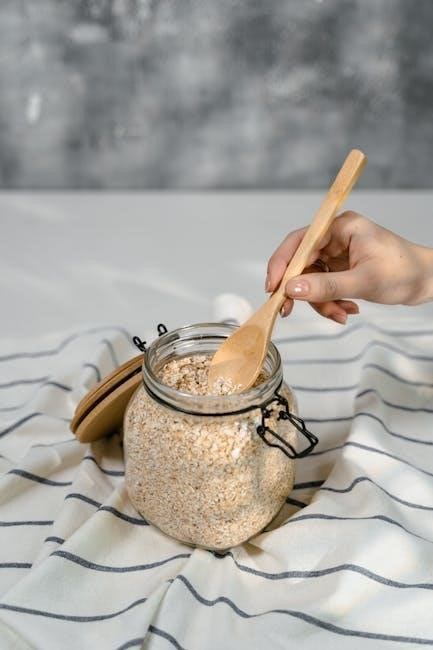This structured, 8-week diet plan is designed to fuel your body for peak performance and endurance. It focuses on macronutrient balance, hydration, and a sample meal plan to help runners lose weight and improve performance.
1.1 Overview of the Plan
This 8-week diet plan for runners provides a structured approach to fueling your body for optimal performance. It focuses on balanced macronutrients, proper hydration, and meal timing, with sample meal plans to support energy needs and weight management. The plan is designed to enhance endurance, speed, and overall running performance while promoting a healthy lifestyle.
1.2 Importance of a Structured Diet for Runners
A structured diet is crucial for runners to ensure proper energy levels, recovery, and overall performance. It helps prevent fatigue, muscle damage, and supports training consistency. A well-planned diet also aids in weight management and enhances endurance, making it essential for achieving running goals and maintaining long-term health.

Understanding Macronutrient Balance for Runners
Macronutrient balance is key for runners, combining carbs for energy, protein for muscle repair, and fats for overall health. Proper balance ensures optimal performance and recovery.
2.1 Carbohydrates: The Primary Energy Source
Carbohydrates are the body’s primary energy source, essential for fueling runs and endurance; Focus on complex carbs like whole grains, fruits, and vegetables, which provide sustained energy. Aim to consume carbs 1-3 hours before runs and replenish glycogen stores post-workout to optimize performance and recovery. Proper timing and intake are crucial for peak performance.
2.2 Protein: Essential for Muscle Repair and Growth
Protein is vital for muscle repair and growth, especially for runners. Include lean meats, fish, beans, and legumes in your diet. Aim for 1.2-1.6 grams of protein per kilogram of body weight daily. Post-run protein intake within 30-60 minutes aids recovery and muscle rebuilding, ensuring optimal performance and reducing injury risk.
2.3 Healthy Fats: Supporting Overall Health
Healthy fats are essential for overall health, supporting hormone production and vitamin absorption. Include sources like nuts, seeds, avocados, and olive oil in your diet. These fats aid in reducing inflammation and provide sustained energy, helping runners maintain endurance and recover effectively between training sessions.
Meal Timing and Frequency
Aim for three main meals and two to three snacks daily, ensuring each meal contains a mix of carbohydrates, proteins, and healthy fats for optimal energy and recovery.
3.1 Pre-Run Meals and Snacks
Pre-run meals should be consumed 1-3 hours before running, focusing on complex carbs, moderate protein, and minimal fat. Examples include oatmeal with fruit, whole-grain toast with peanut butter, or a banana with almonds. Aim for 200-400 calories to provide sustained energy without digestive discomfort. Stay hydrated with water or electrolyte drinks to maintain optimal performance.
- Choose easily digestible foods to avoid stomach discomfort.
- Avoid high-fiber or heavy meals that may cause bloating.
- Experiment with different options during training to find what works best for you.
3.2 Post-Run Recovery Nutrition
After a run, consume a mix of carbohydrates and protein within 30-60 minutes to aid muscle recovery and replenish glycogen stores. Opt for foods like bananas with peanut butter, recovery smoothies, or protein bars. Aim for a 2:1 or 3:1 carb-to-protein ratio; Stay hydrated with water or a sports drink to replenish lost electrolytes.
- Include lean proteins like chicken, eggs, or Greek yogurt.
- Prioritize whole, nutrient-dense foods over supplements.
- Avoid processed sugars and high-fat foods immediately after running.
3.3 Balancing Meals Throughout the Day
Aim for three main meals and two to three snacks daily, ensuring each meal contains a mix of carbohydrates, proteins, and healthy fats. This balanced approach supports energy levels and recovery while preventing extreme hunger or fatigue.
- Incorporate whole grains, lean proteins, and vegetables at mealtimes.
- Snacks should be nutrient-dense, such as fruits, nuts, or yogurt.
- Adjust portion sizes based on training intensity and caloric needs.

Hydration Strategies for Runners
Proper hydration is crucial for performance and recovery. Aim for 6-8 oz of water every hour, adjusting for intensity, weather, and individual needs.
- Drink water regularly throughout the day, not just during runs.
- Monitor urine color to ensure adequate hydration levels.
- Room temperature water absorbs faster than cold or hot water.
4.1 Daily Water Intake Recommendations
Runners should aim for 6-8 oz of water every hour, adjusting for activity level and weather. Room temperature water absorbs faster than cold or hot. Stay hydrated consistently throughout the day, not just during runs, to support performance and prevent dehydration. Carry a water bottle and monitor sweat and urine color for hydration status.
- Drink water regularly before, during, and after runs.
- Adjust intake based on sweat rate and environmental conditions.
- Hydrate adequately to maintain optimal physical function and recovery.
4;2 Hydration During and After Runs
Drink 6-8 oz of water every hour during runs, adjusting for intensity and weather. Room temperature water is absorbed faster. For longer runs, consider electrolyte-rich drinks. After runs, hydrate within 30 minutes to replenish lost fluids and support recovery. Monitor sweat rate and adjust intake accordingly to avoid dehydration and maintain performance levels.
- Consume 16-20 oz of water 1-2 hours before running.
- Use electrolyte drinks for runs exceeding 60 minutes.
- Hydrate post-run to aid recovery and replenish lost fluids.

Key Foods for a Runner’s Diet
Focus on lean meats, fish, nuts, seeds, whole grains, and colorful vegetables. These provide essential protein, healthy fats, and complex carbs for energy and recovery.
5.1 Lean Meats and Fish
Lean meats like turkey, chicken, and beef, along with fish such as salmon and cod, are rich in protein and iron. These foods support muscle repair, energy production, and recovery. Opt for grilled or baked options to avoid excess fat; Fish also provides omega-3 fatty acids, reducing inflammation and improving overall health for runners.
5.2 Nuts, Seeds, and Healthy Snacks
Nuts and seeds are ideal snacks for runners, offering healthy fats, protein, and fiber. Almonds, walnuts, chia seeds, and flaxseeds are great choices, providing sustained energy and supporting muscle function. Pair them with fresh fruits or whole grain crackers for a balanced snack that aids in recovery and keeps you fueled throughout the day.
5.3 Vegetables and Fruits
Vegetables and fruits are packed with vitamins, minerals, and antioxidants, essential for runners’ health. Incorporate a variety like spinach, broccoli, blueberries, and bananas to boost energy levels and support recovery. These foods aid in reducing inflammation and maintaining a balanced diet, ensuring runners stay fueled and healthy throughout their training journey.
5.4 Whole Grains and Complex Carbohydrates
Whole grains and complex carbs are vital for sustained energy; Incorporate foods like brown rice, quinoa, oats, and whole-grain bread to provide long-lasting fuel for runs. These foods are rich in fiber, vitamins, and minerals, supporting digestive health and endurance, making them a cornerstone of a runner’s diet for optimal performance and recovery.

Sample Meal Plan for Each Week
This 8-week meal plan provides balanced options for each day, including lean proteins, whole grains, fruits, and vegetables, ensuring sustained energy and recovery for runners.
6.1 Breakfast Options
Start your day with nutrient-rich breakfasts like oatmeal with fruits, whole-grain toast with avocado, or Greek yogurt with nuts. These options provide sustained energy and support muscle recovery for runners.
6.2 Lunch Ideas
Opt for balanced lunches like grilled chicken wraps with vegetables, quinoa salads with lean meats, or whole-grain pasta with marinara sauce. Include a mix of complex carbs, lean proteins, and healthy fats to maintain energy levels and support muscle recovery throughout the day.
6.3 Dinner Suggestions
Include lean proteins like grilled chicken, fish, or tofu, paired with complex carbs such as brown rice, sweet potatoes, or whole-grain pasta. Add steamed vegetables like broccoli or spinach for essential nutrients. Incorporate healthy fats like avocado or olive oil to support recovery and overall health, ensuring a balanced meal to fuel your runs.
6.4 Snack Recommendations
Opt for nutrient-dense snacks like almonds, energy bars, or fresh fruits. Greek yogurt with berries provides protein and carbs. Smoothies with bananas and spinach are ideal post-run. Aim for snacks rich in healthy fats and proteins to sustain energy levels and support recovery. Timing is key—snack 1 hour pre-run and within 30 minutes post-run for optimal benefits.

Weight Loss Tips for Runners
Focus on a calorie-controlled diet with balanced macronutrients. Maintain a deficit while fueling runs. Prioritize hydration and avoid restrictive eating. Consistency and portion control are key to sustainable weight loss.
7.1 Caloric Intake Management
Managing caloric intake is crucial for weight loss while maintaining energy levels. Aim for a daily deficit of 500-750 calories to promote fat loss without hindering performance. Adjust intake based on mileage and recovery needs. Avoid undereating, as it can lead to fatigue and poor recovery. Monitor progress and tweak calories as needed.
7.2 Avoiding Common Diet Mistakes
Avoid common diet mistakes such as undereating, which can lead to fatigue, and overtraining without proper fuel. Ensure pre-run meals are balanced and recovery nutrition is prioritized. Stay hydrated and avoid excessive reliance on sports drinks. Focus on whole foods and avoid processed snacks to maintain energy levels and support overall performance.

Building a Meal Bank of Recipes
Create a variety of recipes for breakfast, lunch, dinner, and snacks. Include 10 options for each meal type to ensure diversity and nutritional balance throughout the plan.
8.1 Variety in Breakfast, Lunch, and Dinner Options
Incorporate diverse recipes for each meal. Breakfasts might include oatmeal, smoothies, or eggs. Lunches could feature salads, wraps, or soups. Dinners should focus on lean proteins, whole grains, and vegetables, ensuring balanced nutrition to support running performance and recovery throughout the 8-week plan.
8.2 Easy and Nutritious Snack Ideas
Opt for snacks like nuts, seeds, fruits, and energy bars to keep energy levels steady. Include veggie sticks with hummus, yogurt, or smoothies for quick, nutrient-dense options. Trail mix with dried fruits and seeds is also ideal for pre- or post-run fuel, ensuring you stay energized and support recovery throughout your training.
Grocery Shopping Tips
Plan your grocery list to include whole grains, lean proteins, fruits, and vegetables. Shop smart by buying in bulk and choosing seasonal, nutrient-dense foods.
9.1 Planning Your Grocery List
Plan meals for the week, then create a list of essential items like lean meats, whole grains, nuts, seeds, fruits, and vegetables. Stick to your list to avoid impulse buys and ensure you have the necessary ingredients for balanced, nutritious meals that support your running performance and energy needs.
9.2 Smart Shopping for Nutritious Foods
Focus on whole, unprocessed foods like fruits, vegetables, lean proteins, and whole grains. Read labels to avoid added sugars, unhealthy fats, and excess sodium. Shop the store perimeter for fresh options and explore seasonal produce for variety and cost savings. Prioritize quality and nutrient-dense choices to fuel your training effectively.
Tracking Progress and Adjustments
Monitor your weight, performance, and energy levels weekly. Adjust your diet plan based on progress, ensuring you’re fueling properly for both weight loss and running performance.
10.1 Monitoring Weight and Performance
Regularly track your weight and running performance to assess progress. Use a food diary to monitor intake and adjust macronutrient ratios as needed. Ensure you’re fueling adequately to support energy levels and endurance during training sessions, making adjustments to maintain optimal performance and weight management throughout the 8-week plan.
10.2 Adjusting the Diet Plan as Needed
As you progress, adjust your diet based on performance, weight changes, and energy levels. Fine-tune macronutrient ratios, increase portions if under-fueled, or reduce intake if weight loss stalls. Ensure balanced meals, proper hydration, and recovery nutrition to optimize results and maintain consistency throughout the 8-week program.
Common Mistakes to Avoid
Avoid overtraining, undereating, and neglecting hydration. Ensure balanced meals and proper recovery nutrition to prevent performance decline and maintain energy levels throughout the program.
11.1 Overtraining and Undereating
Overtraining and undereating can lead to fatigue, decreased performance, and increased injury risk. Ensure balanced meals, proper hydration, and adequate caloric intake to fuel your runs and support recovery. Avoid neglecting post-run nutrition, as it is crucial for muscle repair and energy replenishment. Listen to your body and adjust your diet plan accordingly.
11.2 Neglecting Recovery Nutrition
Neglecting recovery nutrition can lead to muscle soreness, fatigue, and slower progress. Ensure post-run meals include carbohydrates and protein to replenish energy stores and repair muscles. Aim for a recovery snack within 30 minutes of finishing a run. Staying hydrated with room-temperature water aids absorption and supports overall recovery. Consistency is key to optimal performance.

No Responses